Leadership and Management in NHS
VerifiedAdded on 2023/01/18
|10
|2813
|39
AI Summary
This report discusses the operational context, relevant theoretical models, and recommendations for leadership and management in the National Health Service (NHS). It covers areas such as leadership and management, training and development, and talent management. The report provides insights into the strategies, skills, and behaviors required for effective leadership and management in the NHS.
Contribute Materials
Your contribution can guide someone’s learning journey. Share your
documents today.
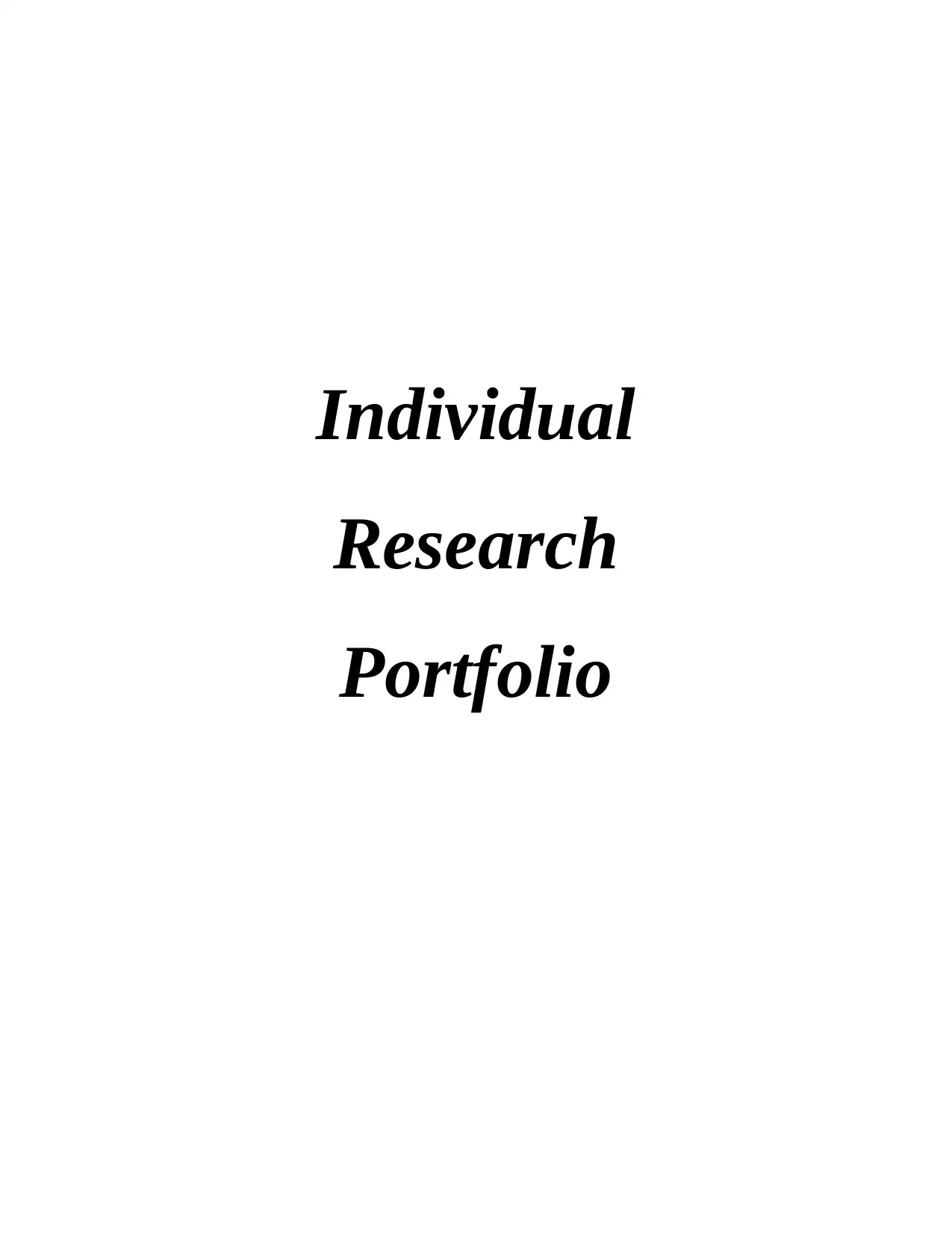
Individual
Research
Portfolio
Research
Portfolio
Secure Best Marks with AI Grader
Need help grading? Try our AI Grader for instant feedback on your assignments.
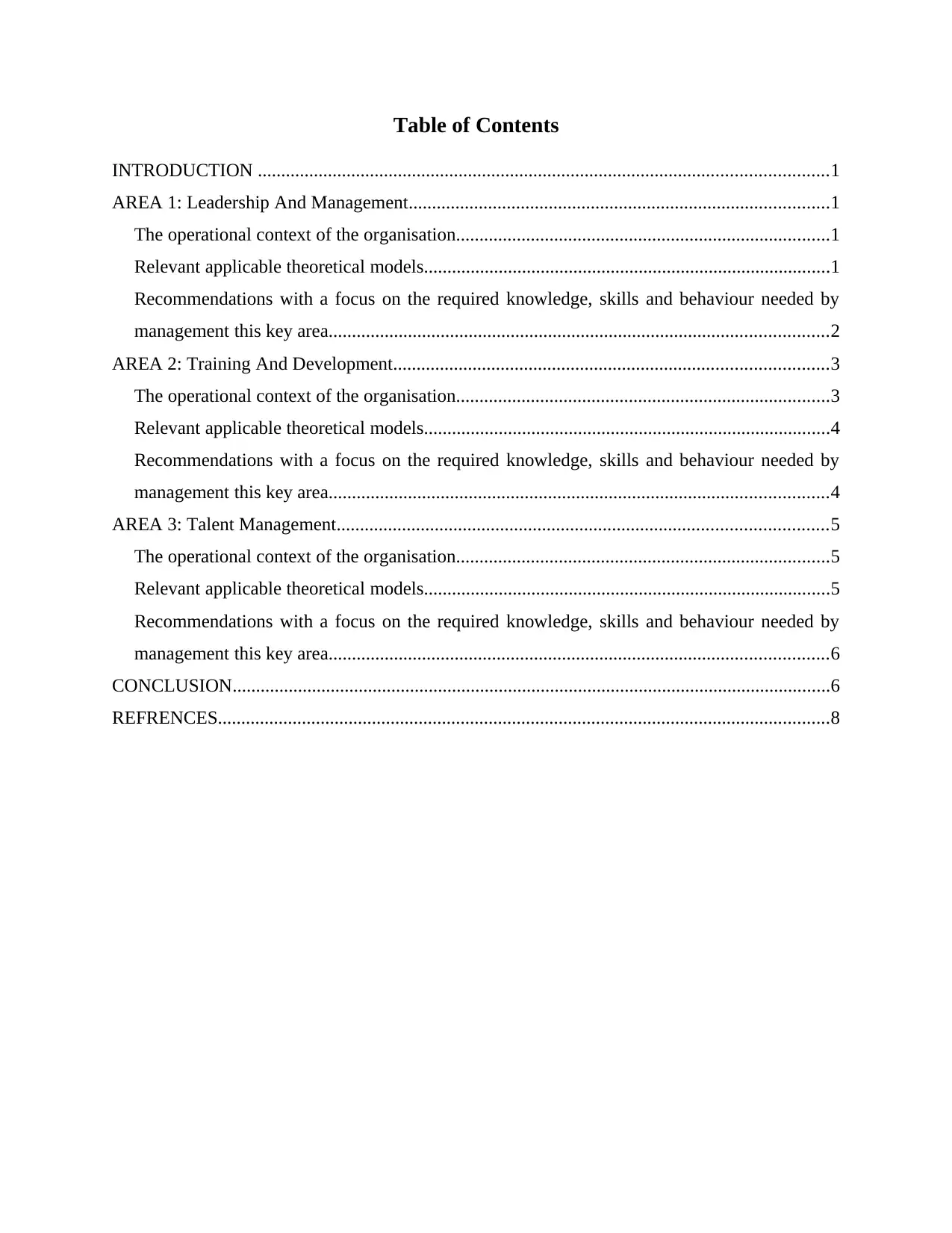
Table of Contents
INTRODUCTION ..........................................................................................................................1
AREA 1: Leadership And Management..........................................................................................1
The operational context of the organisation................................................................................1
Relevant applicable theoretical models.......................................................................................1
Recommendations with a focus on the required knowledge, skills and behaviour needed by
management this key area...........................................................................................................2
AREA 2: Training And Development.............................................................................................3
The operational context of the organisation................................................................................3
Relevant applicable theoretical models.......................................................................................4
Recommendations with a focus on the required knowledge, skills and behaviour needed by
management this key area...........................................................................................................4
AREA 3: Talent Management.........................................................................................................5
The operational context of the organisation................................................................................5
Relevant applicable theoretical models.......................................................................................5
Recommendations with a focus on the required knowledge, skills and behaviour needed by
management this key area...........................................................................................................6
CONCLUSION................................................................................................................................6
REFRENCES...................................................................................................................................8
INTRODUCTION ..........................................................................................................................1
AREA 1: Leadership And Management..........................................................................................1
The operational context of the organisation................................................................................1
Relevant applicable theoretical models.......................................................................................1
Recommendations with a focus on the required knowledge, skills and behaviour needed by
management this key area...........................................................................................................2
AREA 2: Training And Development.............................................................................................3
The operational context of the organisation................................................................................3
Relevant applicable theoretical models.......................................................................................4
Recommendations with a focus on the required knowledge, skills and behaviour needed by
management this key area...........................................................................................................4
AREA 3: Talent Management.........................................................................................................5
The operational context of the organisation................................................................................5
Relevant applicable theoretical models.......................................................................................5
Recommendations with a focus on the required knowledge, skills and behaviour needed by
management this key area...........................................................................................................6
CONCLUSION................................................................................................................................6
REFRENCES...................................................................................................................................8
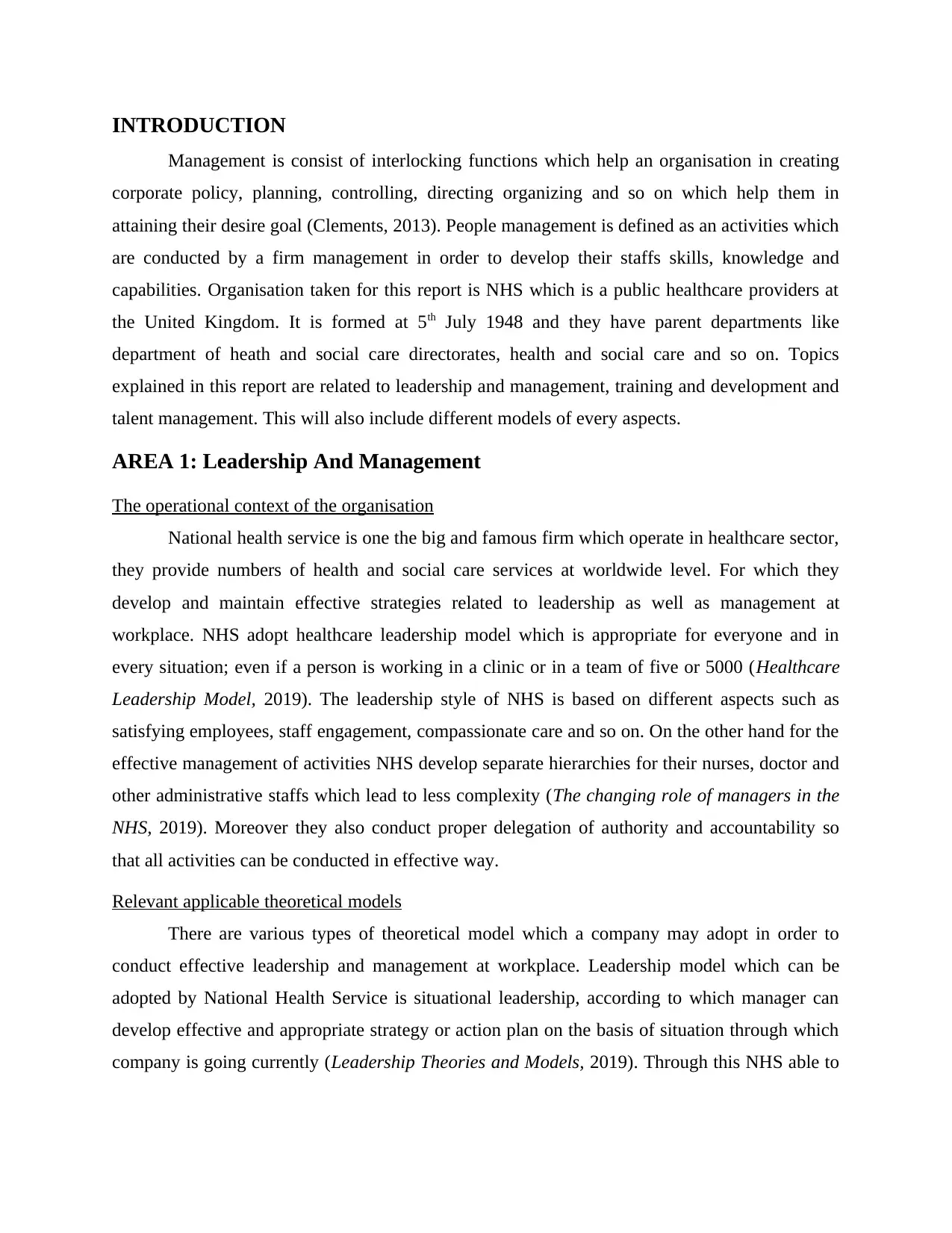
INTRODUCTION
Management is consist of interlocking functions which help an organisation in creating
corporate policy, planning, controlling, directing organizing and so on which help them in
attaining their desire goal (Clements, 2013). People management is defined as an activities which
are conducted by a firm management in order to develop their staffs skills, knowledge and
capabilities. Organisation taken for this report is NHS which is a public healthcare providers at
the United Kingdom. It is formed at 5th July 1948 and they have parent departments like
department of heath and social care directorates, health and social care and so on. Topics
explained in this report are related to leadership and management, training and development and
talent management. This will also include different models of every aspects.
AREA 1: Leadership And Management
The operational context of the organisation
National health service is one the big and famous firm which operate in healthcare sector,
they provide numbers of health and social care services at worldwide level. For which they
develop and maintain effective strategies related to leadership as well as management at
workplace. NHS adopt healthcare leadership model which is appropriate for everyone and in
every situation; even if a person is working in a clinic or in a team of five or 5000 (Healthcare
Leadership Model, 2019). The leadership style of NHS is based on different aspects such as
satisfying employees, staff engagement, compassionate care and so on. On the other hand for the
effective management of activities NHS develop separate hierarchies for their nurses, doctor and
other administrative staffs which lead to less complexity (The changing role of managers in the
NHS, 2019). Moreover they also conduct proper delegation of authority and accountability so
that all activities can be conducted in effective way.
Relevant applicable theoretical models
There are various types of theoretical model which a company may adopt in order to
conduct effective leadership and management at workplace. Leadership model which can be
adopted by National Health Service is situational leadership, according to which manager can
develop effective and appropriate strategy or action plan on the basis of situation through which
company is going currently (Leadership Theories and Models, 2019). Through this NHS able to
Management is consist of interlocking functions which help an organisation in creating
corporate policy, planning, controlling, directing organizing and so on which help them in
attaining their desire goal (Clements, 2013). People management is defined as an activities which
are conducted by a firm management in order to develop their staffs skills, knowledge and
capabilities. Organisation taken for this report is NHS which is a public healthcare providers at
the United Kingdom. It is formed at 5th July 1948 and they have parent departments like
department of heath and social care directorates, health and social care and so on. Topics
explained in this report are related to leadership and management, training and development and
talent management. This will also include different models of every aspects.
AREA 1: Leadership And Management
The operational context of the organisation
National health service is one the big and famous firm which operate in healthcare sector,
they provide numbers of health and social care services at worldwide level. For which they
develop and maintain effective strategies related to leadership as well as management at
workplace. NHS adopt healthcare leadership model which is appropriate for everyone and in
every situation; even if a person is working in a clinic or in a team of five or 5000 (Healthcare
Leadership Model, 2019). The leadership style of NHS is based on different aspects such as
satisfying employees, staff engagement, compassionate care and so on. On the other hand for the
effective management of activities NHS develop separate hierarchies for their nurses, doctor and
other administrative staffs which lead to less complexity (The changing role of managers in the
NHS, 2019). Moreover they also conduct proper delegation of authority and accountability so
that all activities can be conducted in effective way.
Relevant applicable theoretical models
There are various types of theoretical model which a company may adopt in order to
conduct effective leadership and management at workplace. Leadership model which can be
adopted by National Health Service is situational leadership, according to which manager can
develop effective and appropriate strategy or action plan on the basis of situation through which
company is going currently (Leadership Theories and Models, 2019). Through this NHS able to
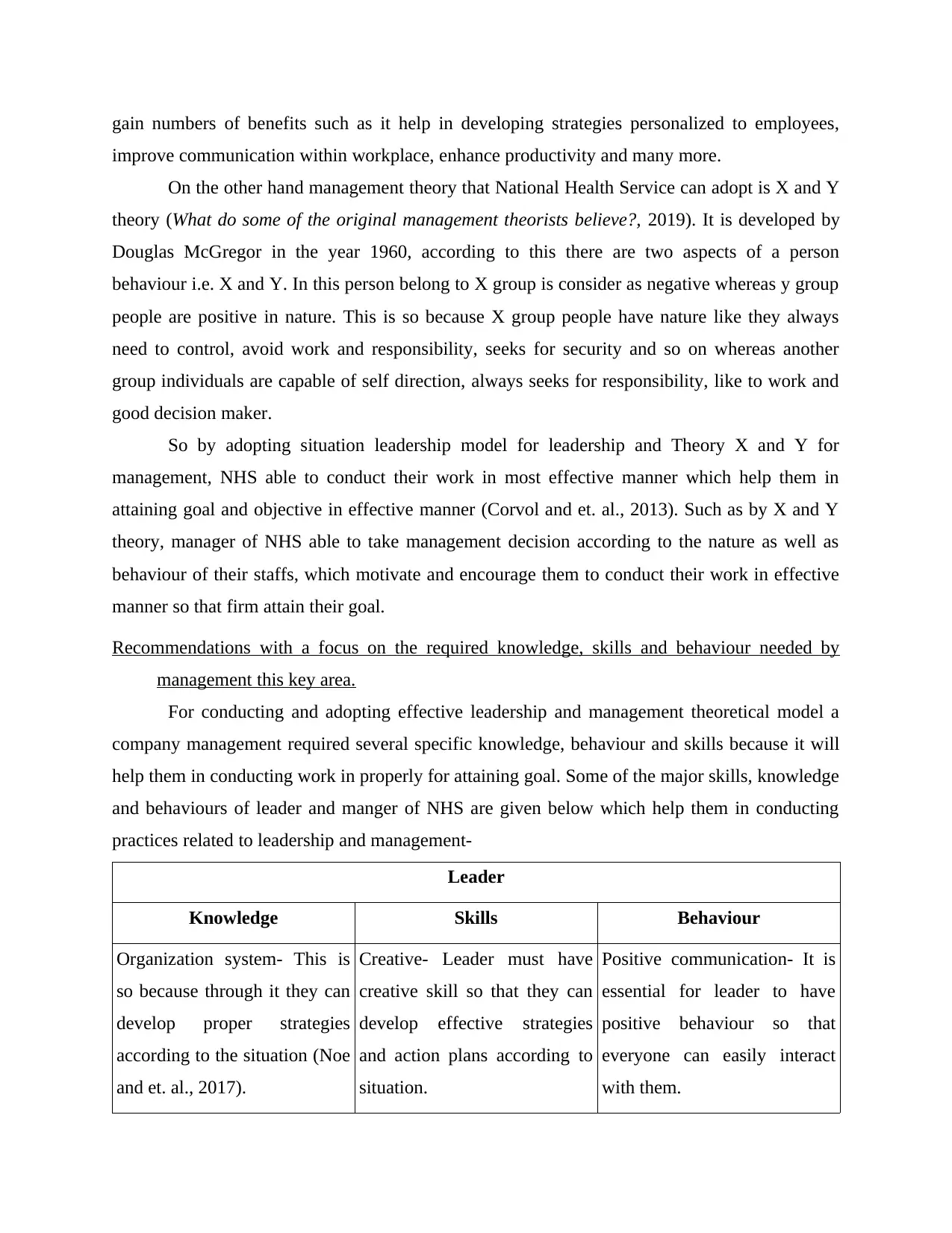
gain numbers of benefits such as it help in developing strategies personalized to employees,
improve communication within workplace, enhance productivity and many more.
On the other hand management theory that National Health Service can adopt is X and Y
theory (What do some of the original management theorists believe?, 2019). It is developed by
Douglas McGregor in the year 1960, according to this there are two aspects of a person
behaviour i.e. X and Y. In this person belong to X group is consider as negative whereas y group
people are positive in nature. This is so because X group people have nature like they always
need to control, avoid work and responsibility, seeks for security and so on whereas another
group individuals are capable of self direction, always seeks for responsibility, like to work and
good decision maker.
So by adopting situation leadership model for leadership and Theory X and Y for
management, NHS able to conduct their work in most effective manner which help them in
attaining goal and objective in effective manner (Corvol and et. al., 2013). Such as by X and Y
theory, manager of NHS able to take management decision according to the nature as well as
behaviour of their staffs, which motivate and encourage them to conduct their work in effective
manner so that firm attain their goal.
Recommendations with a focus on the required knowledge, skills and behaviour needed by
management this key area.
For conducting and adopting effective leadership and management theoretical model a
company management required several specific knowledge, behaviour and skills because it will
help them in conducting work in properly for attaining goal. Some of the major skills, knowledge
and behaviours of leader and manger of NHS are given below which help them in conducting
practices related to leadership and management-
Leader
Knowledge Skills Behaviour
Organization system- This is
so because through it they can
develop proper strategies
according to the situation (Noe
and et. al., 2017).
Creative- Leader must have
creative skill so that they can
develop effective strategies
and action plans according to
situation.
Positive communication- It is
essential for leader to have
positive behaviour so that
everyone can easily interact
with them.
improve communication within workplace, enhance productivity and many more.
On the other hand management theory that National Health Service can adopt is X and Y
theory (What do some of the original management theorists believe?, 2019). It is developed by
Douglas McGregor in the year 1960, according to this there are two aspects of a person
behaviour i.e. X and Y. In this person belong to X group is consider as negative whereas y group
people are positive in nature. This is so because X group people have nature like they always
need to control, avoid work and responsibility, seeks for security and so on whereas another
group individuals are capable of self direction, always seeks for responsibility, like to work and
good decision maker.
So by adopting situation leadership model for leadership and Theory X and Y for
management, NHS able to conduct their work in most effective manner which help them in
attaining goal and objective in effective manner (Corvol and et. al., 2013). Such as by X and Y
theory, manager of NHS able to take management decision according to the nature as well as
behaviour of their staffs, which motivate and encourage them to conduct their work in effective
manner so that firm attain their goal.
Recommendations with a focus on the required knowledge, skills and behaviour needed by
management this key area.
For conducting and adopting effective leadership and management theoretical model a
company management required several specific knowledge, behaviour and skills because it will
help them in conducting work in properly for attaining goal. Some of the major skills, knowledge
and behaviours of leader and manger of NHS are given below which help them in conducting
practices related to leadership and management-
Leader
Knowledge Skills Behaviour
Organization system- This is
so because through it they can
develop proper strategies
according to the situation (Noe
and et. al., 2017).
Creative- Leader must have
creative skill so that they can
develop effective strategies
and action plans according to
situation.
Positive communication- It is
essential for leader to have
positive behaviour so that
everyone can easily interact
with them.
Secure Best Marks with AI Grader
Need help grading? Try our AI Grader for instant feedback on your assignments.
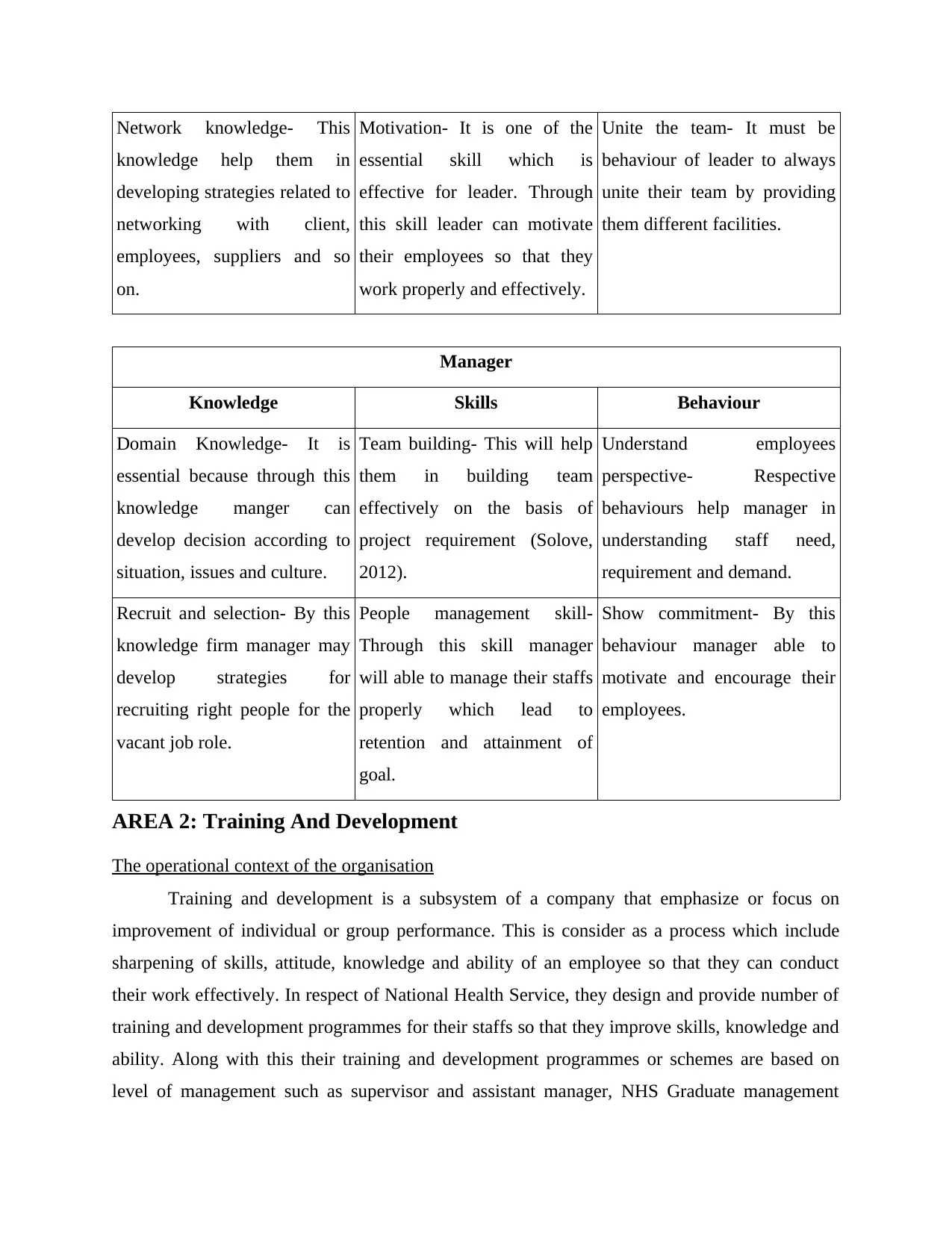
Network knowledge- This
knowledge help them in
developing strategies related to
networking with client,
employees, suppliers and so
on.
Motivation- It is one of the
essential skill which is
effective for leader. Through
this skill leader can motivate
their employees so that they
work properly and effectively.
Unite the team- It must be
behaviour of leader to always
unite their team by providing
them different facilities.
Manager
Knowledge Skills Behaviour
Domain Knowledge- It is
essential because through this
knowledge manger can
develop decision according to
situation, issues and culture.
Team building- This will help
them in building team
effectively on the basis of
project requirement (Solove,
2012).
Understand employees
perspective- Respective
behaviours help manager in
understanding staff need,
requirement and demand.
Recruit and selection- By this
knowledge firm manager may
develop strategies for
recruiting right people for the
vacant job role.
People management skill-
Through this skill manager
will able to manage their staffs
properly which lead to
retention and attainment of
goal.
Show commitment- By this
behaviour manager able to
motivate and encourage their
employees.
AREA 2: Training And Development
The operational context of the organisation
Training and development is a subsystem of a company that emphasize or focus on
improvement of individual or group performance. This is consider as a process which include
sharpening of skills, attitude, knowledge and ability of an employee so that they can conduct
their work effectively. In respect of National Health Service, they design and provide number of
training and development programmes for their staffs so that they improve skills, knowledge and
ability. Along with this their training and development programmes or schemes are based on
level of management such as supervisor and assistant manager, NHS Graduate management
knowledge help them in
developing strategies related to
networking with client,
employees, suppliers and so
on.
Motivation- It is one of the
essential skill which is
effective for leader. Through
this skill leader can motivate
their employees so that they
work properly and effectively.
Unite the team- It must be
behaviour of leader to always
unite their team by providing
them different facilities.
Manager
Knowledge Skills Behaviour
Domain Knowledge- It is
essential because through this
knowledge manger can
develop decision according to
situation, issues and culture.
Team building- This will help
them in building team
effectively on the basis of
project requirement (Solove,
2012).
Understand employees
perspective- Respective
behaviours help manager in
understanding staff need,
requirement and demand.
Recruit and selection- By this
knowledge firm manager may
develop strategies for
recruiting right people for the
vacant job role.
People management skill-
Through this skill manager
will able to manage their staffs
properly which lead to
retention and attainment of
goal.
Show commitment- By this
behaviour manager able to
motivate and encourage their
employees.
AREA 2: Training And Development
The operational context of the organisation
Training and development is a subsystem of a company that emphasize or focus on
improvement of individual or group performance. This is consider as a process which include
sharpening of skills, attitude, knowledge and ability of an employee so that they can conduct
their work effectively. In respect of National Health Service, they design and provide number of
training and development programmes for their staffs so that they improve skills, knowledge and
ability. Along with this their training and development programmes or schemes are based on
level of management such as supervisor and assistant manager, NHS Graduate management
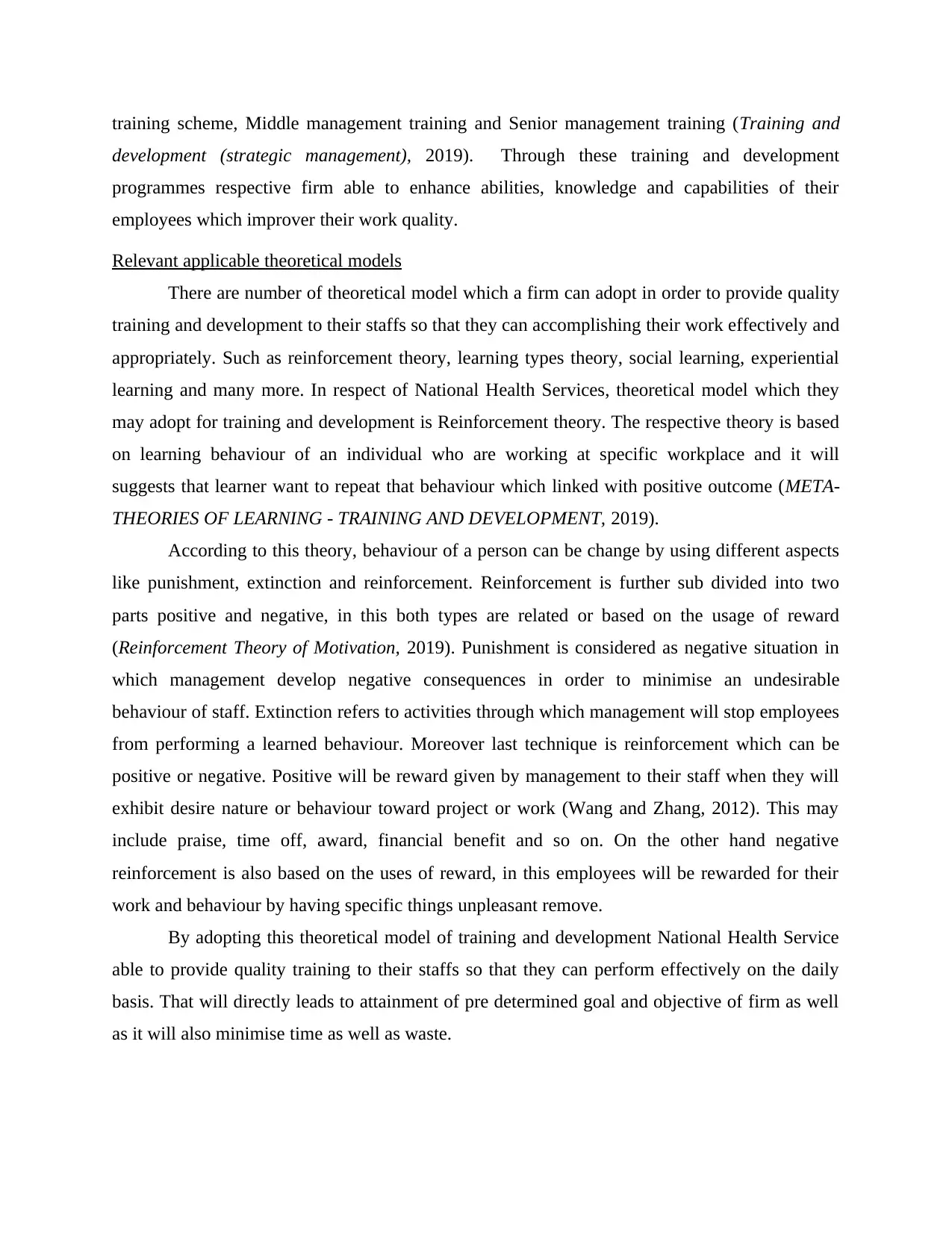
training scheme, Middle management training and Senior management training (Training and
development (strategic management), 2019). Through these training and development
programmes respective firm able to enhance abilities, knowledge and capabilities of their
employees which improver their work quality.
Relevant applicable theoretical models
There are number of theoretical model which a firm can adopt in order to provide quality
training and development to their staffs so that they can accomplishing their work effectively and
appropriately. Such as reinforcement theory, learning types theory, social learning, experiential
learning and many more. In respect of National Health Services, theoretical model which they
may adopt for training and development is Reinforcement theory. The respective theory is based
on learning behaviour of an individual who are working at specific workplace and it will
suggests that learner want to repeat that behaviour which linked with positive outcome (META-
THEORIES OF LEARNING - TRAINING AND DEVELOPMENT, 2019).
According to this theory, behaviour of a person can be change by using different aspects
like punishment, extinction and reinforcement. Reinforcement is further sub divided into two
parts positive and negative, in this both types are related or based on the usage of reward
(Reinforcement Theory of Motivation, 2019). Punishment is considered as negative situation in
which management develop negative consequences in order to minimise an undesirable
behaviour of staff. Extinction refers to activities through which management will stop employees
from performing a learned behaviour. Moreover last technique is reinforcement which can be
positive or negative. Positive will be reward given by management to their staff when they will
exhibit desire nature or behaviour toward project or work (Wang and Zhang, 2012). This may
include praise, time off, award, financial benefit and so on. On the other hand negative
reinforcement is also based on the uses of reward, in this employees will be rewarded for their
work and behaviour by having specific things unpleasant remove.
By adopting this theoretical model of training and development National Health Service
able to provide quality training to their staffs so that they can perform effectively on the daily
basis. That will directly leads to attainment of pre determined goal and objective of firm as well
as it will also minimise time as well as waste.
development (strategic management), 2019). Through these training and development
programmes respective firm able to enhance abilities, knowledge and capabilities of their
employees which improver their work quality.
Relevant applicable theoretical models
There are number of theoretical model which a firm can adopt in order to provide quality
training and development to their staffs so that they can accomplishing their work effectively and
appropriately. Such as reinforcement theory, learning types theory, social learning, experiential
learning and many more. In respect of National Health Services, theoretical model which they
may adopt for training and development is Reinforcement theory. The respective theory is based
on learning behaviour of an individual who are working at specific workplace and it will
suggests that learner want to repeat that behaviour which linked with positive outcome (META-
THEORIES OF LEARNING - TRAINING AND DEVELOPMENT, 2019).
According to this theory, behaviour of a person can be change by using different aspects
like punishment, extinction and reinforcement. Reinforcement is further sub divided into two
parts positive and negative, in this both types are related or based on the usage of reward
(Reinforcement Theory of Motivation, 2019). Punishment is considered as negative situation in
which management develop negative consequences in order to minimise an undesirable
behaviour of staff. Extinction refers to activities through which management will stop employees
from performing a learned behaviour. Moreover last technique is reinforcement which can be
positive or negative. Positive will be reward given by management to their staff when they will
exhibit desire nature or behaviour toward project or work (Wang and Zhang, 2012). This may
include praise, time off, award, financial benefit and so on. On the other hand negative
reinforcement is also based on the uses of reward, in this employees will be rewarded for their
work and behaviour by having specific things unpleasant remove.
By adopting this theoretical model of training and development National Health Service
able to provide quality training to their staffs so that they can perform effectively on the daily
basis. That will directly leads to attainment of pre determined goal and objective of firm as well
as it will also minimise time as well as waste.
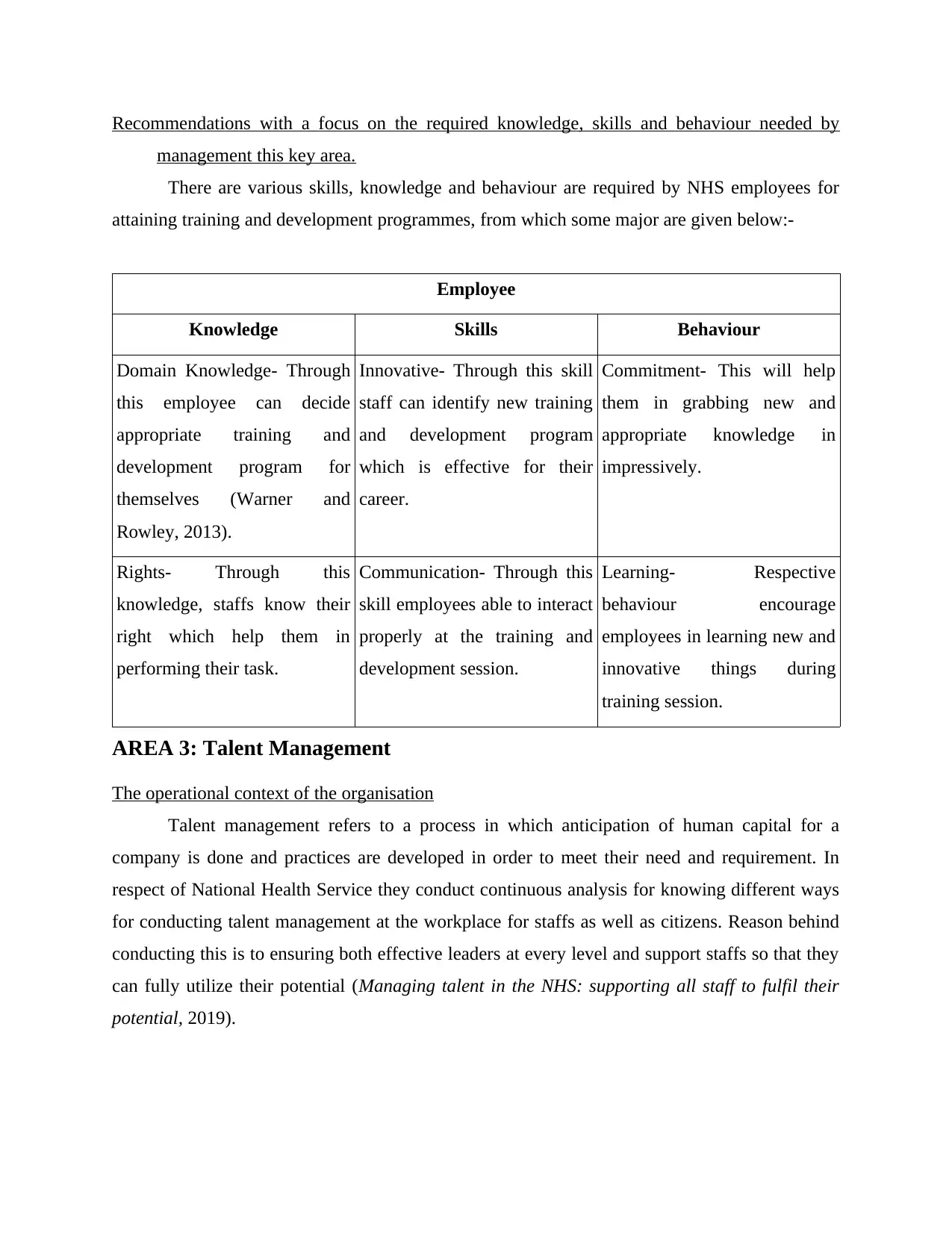
Recommendations with a focus on the required knowledge, skills and behaviour needed by
management this key area.
There are various skills, knowledge and behaviour are required by NHS employees for
attaining training and development programmes, from which some major are given below:-
Employee
Knowledge Skills Behaviour
Domain Knowledge- Through
this employee can decide
appropriate training and
development program for
themselves (Warner and
Rowley, 2013).
Innovative- Through this skill
staff can identify new training
and development program
which is effective for their
career.
Commitment- This will help
them in grabbing new and
appropriate knowledge in
impressively.
Rights- Through this
knowledge, staffs know their
right which help them in
performing their task.
Communication- Through this
skill employees able to interact
properly at the training and
development session.
Learning- Respective
behaviour encourage
employees in learning new and
innovative things during
training session.
AREA 3: Talent Management
The operational context of the organisation
Talent management refers to a process in which anticipation of human capital for a
company is done and practices are developed in order to meet their need and requirement. In
respect of National Health Service they conduct continuous analysis for knowing different ways
for conducting talent management at the workplace for staffs as well as citizens. Reason behind
conducting this is to ensuring both effective leaders at every level and support staffs so that they
can fully utilize their potential (Managing talent in the NHS: supporting all staff to fulfil their
potential, 2019).
management this key area.
There are various skills, knowledge and behaviour are required by NHS employees for
attaining training and development programmes, from which some major are given below:-
Employee
Knowledge Skills Behaviour
Domain Knowledge- Through
this employee can decide
appropriate training and
development program for
themselves (Warner and
Rowley, 2013).
Innovative- Through this skill
staff can identify new training
and development program
which is effective for their
career.
Commitment- This will help
them in grabbing new and
appropriate knowledge in
impressively.
Rights- Through this
knowledge, staffs know their
right which help them in
performing their task.
Communication- Through this
skill employees able to interact
properly at the training and
development session.
Learning- Respective
behaviour encourage
employees in learning new and
innovative things during
training session.
AREA 3: Talent Management
The operational context of the organisation
Talent management refers to a process in which anticipation of human capital for a
company is done and practices are developed in order to meet their need and requirement. In
respect of National Health Service they conduct continuous analysis for knowing different ways
for conducting talent management at the workplace for staffs as well as citizens. Reason behind
conducting this is to ensuring both effective leaders at every level and support staffs so that they
can fully utilize their potential (Managing talent in the NHS: supporting all staff to fulfil their
potential, 2019).
Paraphrase This Document
Need a fresh take? Get an instant paraphrase of this document with our AI Paraphraser
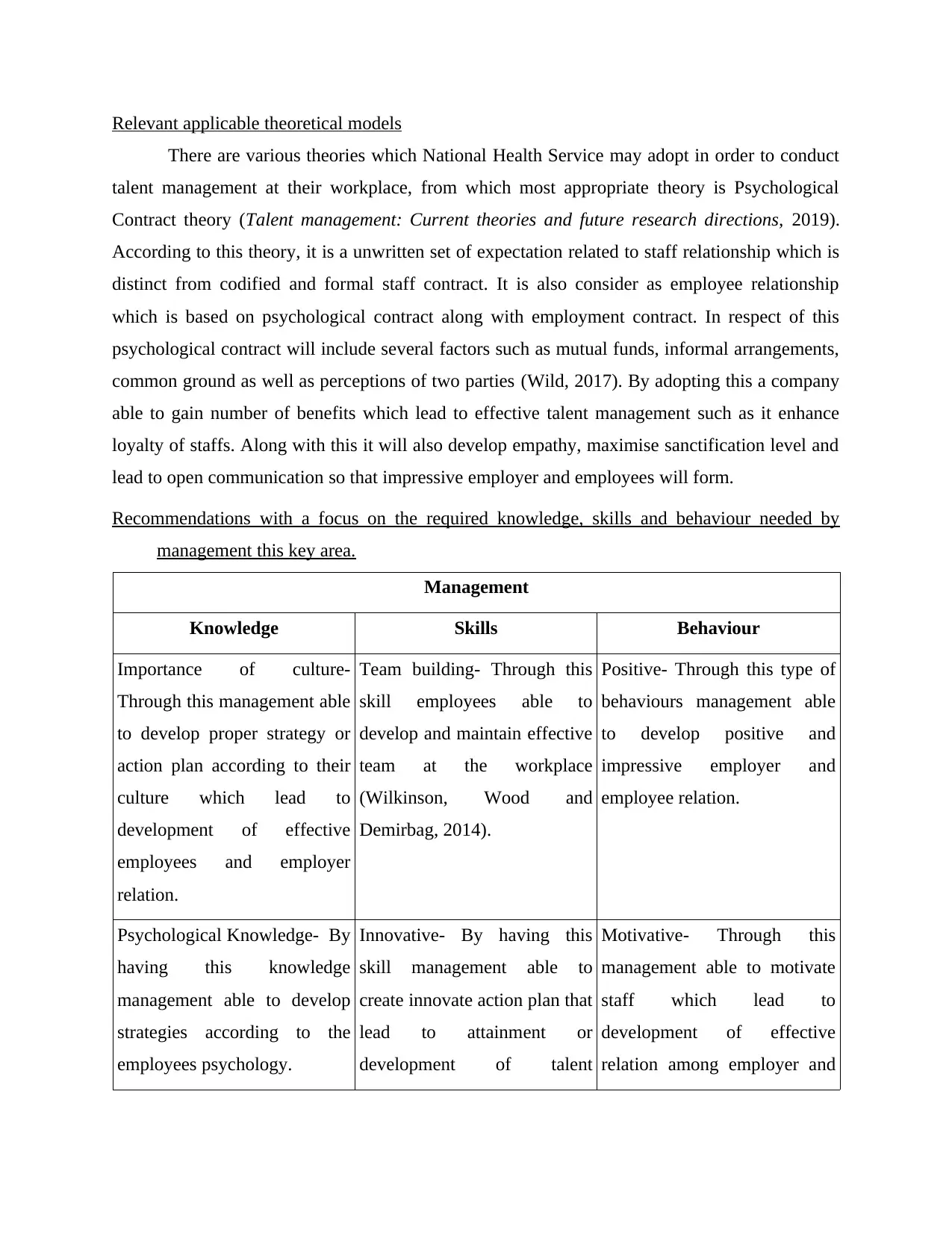
Relevant applicable theoretical models
There are various theories which National Health Service may adopt in order to conduct
talent management at their workplace, from which most appropriate theory is Psychological
Contract theory (Talent management: Current theories and future research directions, 2019).
According to this theory, it is a unwritten set of expectation related to staff relationship which is
distinct from codified and formal staff contract. It is also consider as employee relationship
which is based on psychological contract along with employment contract. In respect of this
psychological contract will include several factors such as mutual funds, informal arrangements,
common ground as well as perceptions of two parties (Wild, 2017). By adopting this a company
able to gain number of benefits which lead to effective talent management such as it enhance
loyalty of staffs. Along with this it will also develop empathy, maximise sanctification level and
lead to open communication so that impressive employer and employees will form.
Recommendations with a focus on the required knowledge, skills and behaviour needed by
management this key area.
Management
Knowledge Skills Behaviour
Importance of culture-
Through this management able
to develop proper strategy or
action plan according to their
culture which lead to
development of effective
employees and employer
relation.
Team building- Through this
skill employees able to
develop and maintain effective
team at the workplace
(Wilkinson, Wood and
Demirbag, 2014).
Positive- Through this type of
behaviours management able
to develop positive and
impressive employer and
employee relation.
Psychological Knowledge- By
having this knowledge
management able to develop
strategies according to the
employees psychology.
Innovative- By having this
skill management able to
create innovate action plan that
lead to attainment or
development of talent
Motivative- Through this
management able to motivate
staff which lead to
development of effective
relation among employer and
There are various theories which National Health Service may adopt in order to conduct
talent management at their workplace, from which most appropriate theory is Psychological
Contract theory (Talent management: Current theories and future research directions, 2019).
According to this theory, it is a unwritten set of expectation related to staff relationship which is
distinct from codified and formal staff contract. It is also consider as employee relationship
which is based on psychological contract along with employment contract. In respect of this
psychological contract will include several factors such as mutual funds, informal arrangements,
common ground as well as perceptions of two parties (Wild, 2017). By adopting this a company
able to gain number of benefits which lead to effective talent management such as it enhance
loyalty of staffs. Along with this it will also develop empathy, maximise sanctification level and
lead to open communication so that impressive employer and employees will form.
Recommendations with a focus on the required knowledge, skills and behaviour needed by
management this key area.
Management
Knowledge Skills Behaviour
Importance of culture-
Through this management able
to develop proper strategy or
action plan according to their
culture which lead to
development of effective
employees and employer
relation.
Team building- Through this
skill employees able to
develop and maintain effective
team at the workplace
(Wilkinson, Wood and
Demirbag, 2014).
Positive- Through this type of
behaviours management able
to develop positive and
impressive employer and
employee relation.
Psychological Knowledge- By
having this knowledge
management able to develop
strategies according to the
employees psychology.
Innovative- By having this
skill management able to
create innovate action plan that
lead to attainment or
development of talent
Motivative- Through this
management able to motivate
staff which lead to
development of effective
relation among employer and
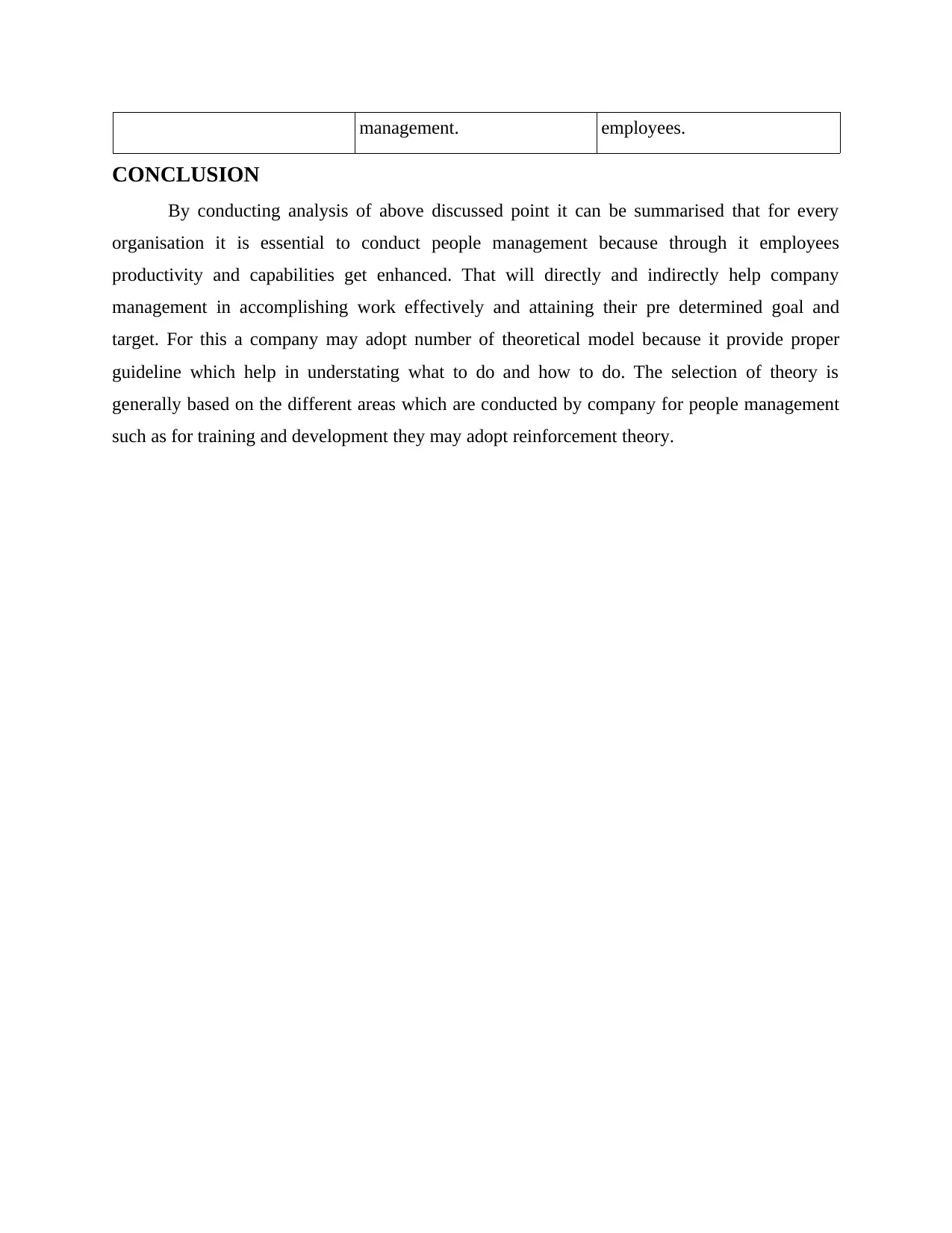
management. employees.
CONCLUSION
By conducting analysis of above discussed point it can be summarised that for every
organisation it is essential to conduct people management because through it employees
productivity and capabilities get enhanced. That will directly and indirectly help company
management in accomplishing work effectively and attaining their pre determined goal and
target. For this a company may adopt number of theoretical model because it provide proper
guideline which help in understating what to do and how to do. The selection of theory is
generally based on the different areas which are conducted by company for people management
such as for training and development they may adopt reinforcement theory.
CONCLUSION
By conducting analysis of above discussed point it can be summarised that for every
organisation it is essential to conduct people management because through it employees
productivity and capabilities get enhanced. That will directly and indirectly help company
management in accomplishing work effectively and attaining their pre determined goal and
target. For this a company may adopt number of theoretical model because it provide proper
guideline which help in understating what to do and how to do. The selection of theory is
generally based on the different areas which are conducted by company for people management
such as for training and development they may adopt reinforcement theory.
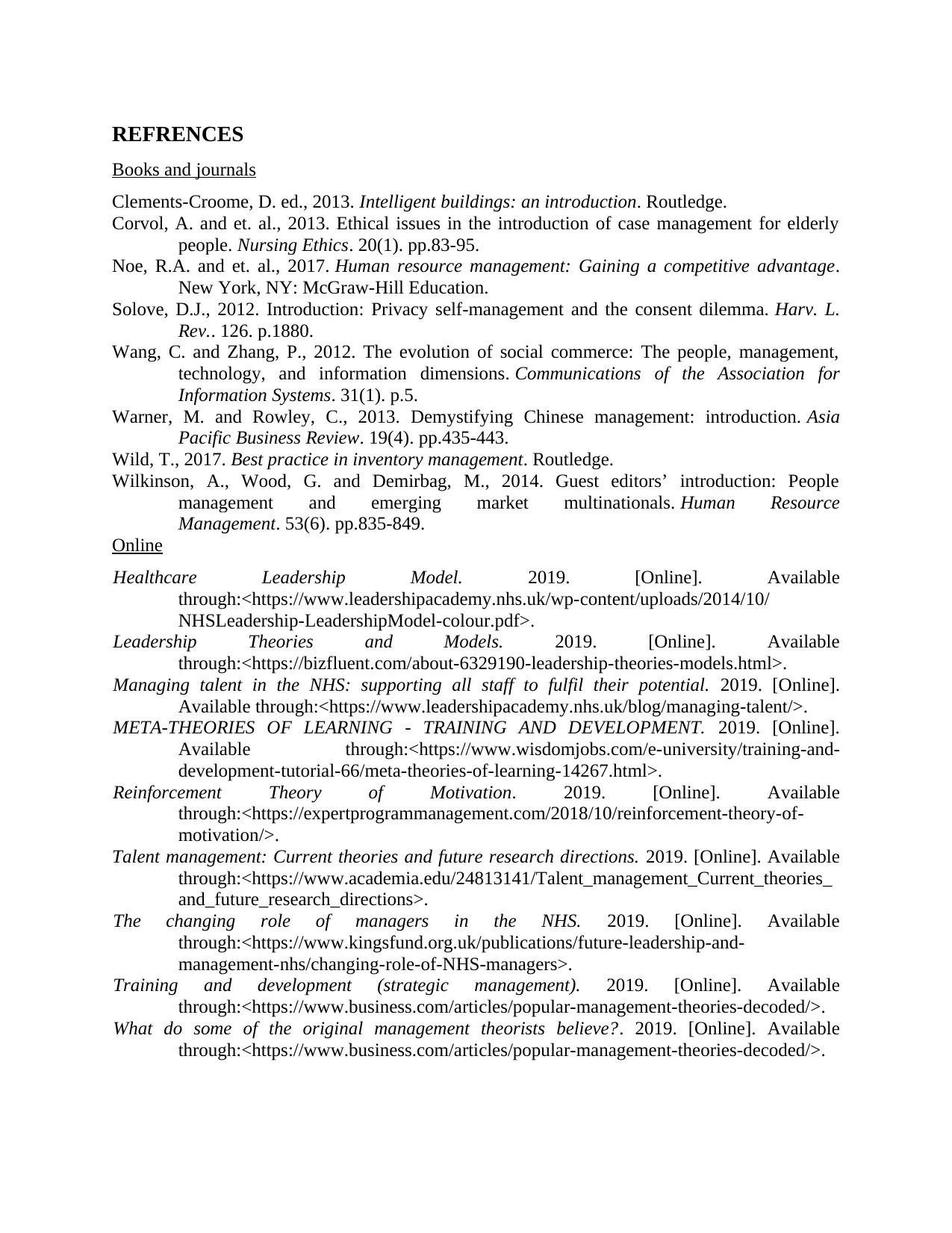
REFRENCES
Books and journals
Clements-Croome, D. ed., 2013. Intelligent buildings: an introduction. Routledge.
Corvol, A. and et. al., 2013. Ethical issues in the introduction of case management for elderly
people. Nursing Ethics. 20(1). pp.83-95.
Noe, R.A. and et. al., 2017. Human resource management: Gaining a competitive advantage.
New York, NY: McGraw-Hill Education.
Solove, D.J., 2012. Introduction: Privacy self-management and the consent dilemma. Harv. L.
Rev.. 126. p.1880.
Wang, C. and Zhang, P., 2012. The evolution of social commerce: The people, management,
technology, and information dimensions. Communications of the Association for
Information Systems. 31(1). p.5.
Warner, M. and Rowley, C., 2013. Demystifying Chinese management: introduction. Asia
Pacific Business Review. 19(4). pp.435-443.
Wild, T., 2017. Best practice in inventory management. Routledge.
Wilkinson, A., Wood, G. and Demirbag, M., 2014. Guest editors’ introduction: People
management and emerging market multinationals. Human Resource
Management. 53(6). pp.835-849.
Online
Healthcare Leadership Model. 2019. [Online]. Available
through:<https://www.leadershipacademy.nhs.uk/wp-content/uploads/2014/10/
NHSLeadership-LeadershipModel-colour.pdf>.
Leadership Theories and Models. 2019. [Online]. Available
through:<https://bizfluent.com/about-6329190-leadership-theories-models.html>.
Managing talent in the NHS: supporting all staff to fulfil their potential. 2019. [Online].
Available through:<https://www.leadershipacademy.nhs.uk/blog/managing-talent/>.
META-THEORIES OF LEARNING - TRAINING AND DEVELOPMENT. 2019. [Online].
Available through:<https://www.wisdomjobs.com/e-university/training-and-
development-tutorial-66/meta-theories-of-learning-14267.html>.
Reinforcement Theory of Motivation. 2019. [Online]. Available
through:<https://expertprogrammanagement.com/2018/10/reinforcement-theory-of-
motivation/>.
Talent management: Current theories and future research directions. 2019. [Online]. Available
through:<https://www.academia.edu/24813141/Talent_management_Current_theories_
and_future_research_directions>.
The changing role of managers in the NHS. 2019. [Online]. Available
through:<https://www.kingsfund.org.uk/publications/future-leadership-and-
management-nhs/changing-role-of-NHS-managers>.
Training and development (strategic management). 2019. [Online]. Available
through:<https://www.business.com/articles/popular-management-theories-decoded/>.
What do some of the original management theorists believe?. 2019. [Online]. Available
through:<https://www.business.com/articles/popular-management-theories-decoded/>.
Books and journals
Clements-Croome, D. ed., 2013. Intelligent buildings: an introduction. Routledge.
Corvol, A. and et. al., 2013. Ethical issues in the introduction of case management for elderly
people. Nursing Ethics. 20(1). pp.83-95.
Noe, R.A. and et. al., 2017. Human resource management: Gaining a competitive advantage.
New York, NY: McGraw-Hill Education.
Solove, D.J., 2012. Introduction: Privacy self-management and the consent dilemma. Harv. L.
Rev.. 126. p.1880.
Wang, C. and Zhang, P., 2012. The evolution of social commerce: The people, management,
technology, and information dimensions. Communications of the Association for
Information Systems. 31(1). p.5.
Warner, M. and Rowley, C., 2013. Demystifying Chinese management: introduction. Asia
Pacific Business Review. 19(4). pp.435-443.
Wild, T., 2017. Best practice in inventory management. Routledge.
Wilkinson, A., Wood, G. and Demirbag, M., 2014. Guest editors’ introduction: People
management and emerging market multinationals. Human Resource
Management. 53(6). pp.835-849.
Online
Healthcare Leadership Model. 2019. [Online]. Available
through:<https://www.leadershipacademy.nhs.uk/wp-content/uploads/2014/10/
NHSLeadership-LeadershipModel-colour.pdf>.
Leadership Theories and Models. 2019. [Online]. Available
through:<https://bizfluent.com/about-6329190-leadership-theories-models.html>.
Managing talent in the NHS: supporting all staff to fulfil their potential. 2019. [Online].
Available through:<https://www.leadershipacademy.nhs.uk/blog/managing-talent/>.
META-THEORIES OF LEARNING - TRAINING AND DEVELOPMENT. 2019. [Online].
Available through:<https://www.wisdomjobs.com/e-university/training-and-
development-tutorial-66/meta-theories-of-learning-14267.html>.
Reinforcement Theory of Motivation. 2019. [Online]. Available
through:<https://expertprogrammanagement.com/2018/10/reinforcement-theory-of-
motivation/>.
Talent management: Current theories and future research directions. 2019. [Online]. Available
through:<https://www.academia.edu/24813141/Talent_management_Current_theories_
and_future_research_directions>.
The changing role of managers in the NHS. 2019. [Online]. Available
through:<https://www.kingsfund.org.uk/publications/future-leadership-and-
management-nhs/changing-role-of-NHS-managers>.
Training and development (strategic management). 2019. [Online]. Available
through:<https://www.business.com/articles/popular-management-theories-decoded/>.
What do some of the original management theorists believe?. 2019. [Online]. Available
through:<https://www.business.com/articles/popular-management-theories-decoded/>.
1 out of 10
Related Documents
Your All-in-One AI-Powered Toolkit for Academic Success.
+13062052269
info@desklib.com
Available 24*7 on WhatsApp / Email
![[object Object]](/_next/static/media/star-bottom.7253800d.svg)
Unlock your academic potential
© 2024 | Zucol Services PVT LTD | All rights reserved.





